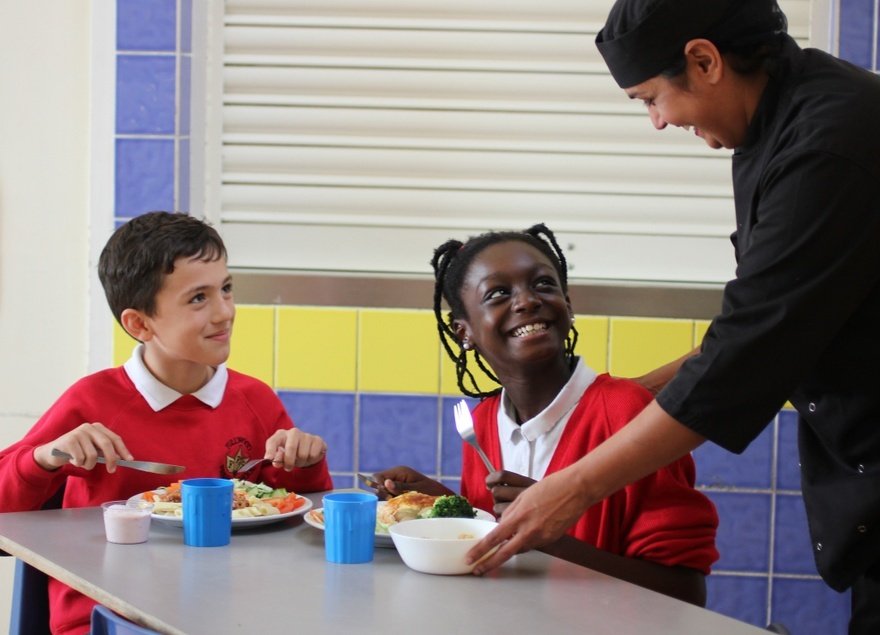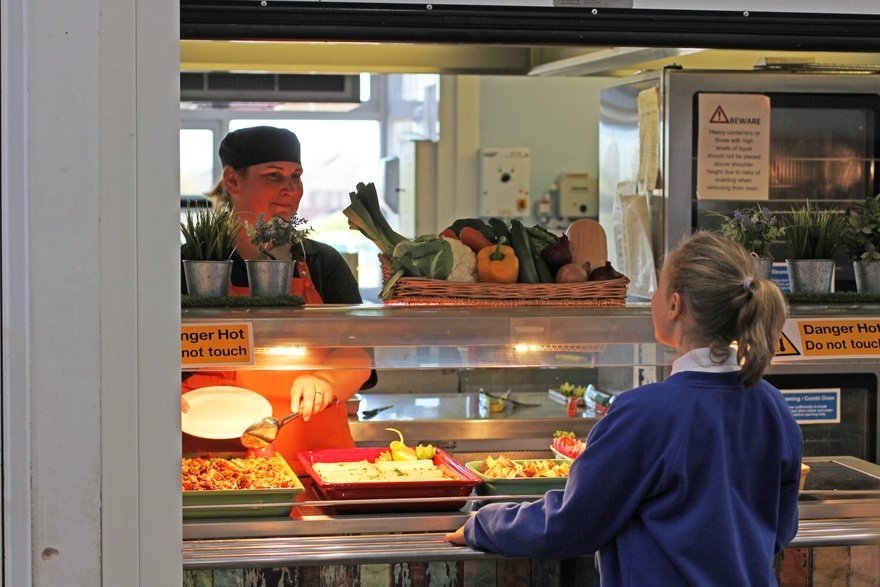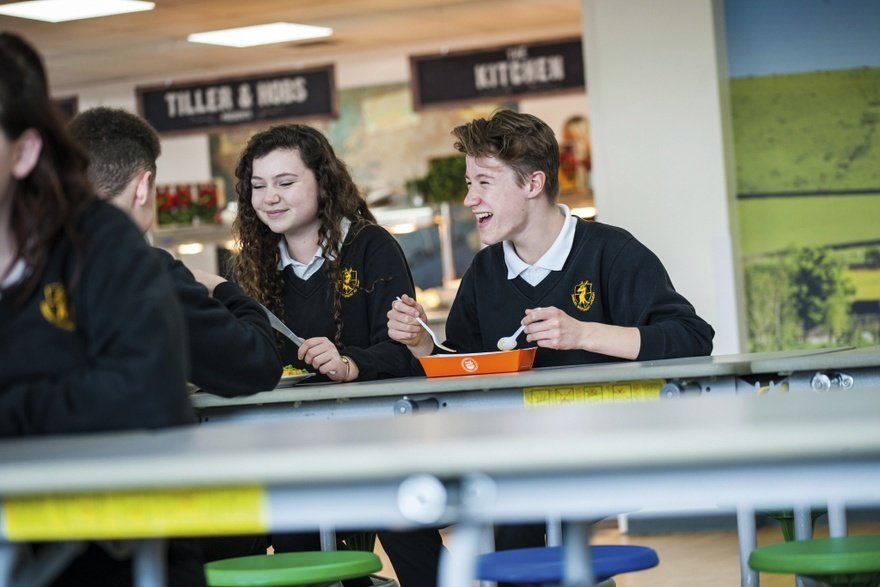Public Sector Caterer Catey winner Mark Davies on how the perception of school dinners has changed over 15 years in the business
The managing director of ISS UK Food Services and winner of the 2020 Public Sector Caterer Catey talks to Lisa Jenkins about how the perception of school dinners has changed over his 15 years in the business.
What has been your greatest achievement in the sector over the last 15 years?
In terms of the industry, someone once said to me: "a rising tide raises all ships". I've always wanted to work in an environment where we compete to be the best school food provider rather than the cheapest. The second scenario is no good for the children and does nothing for long-term sustainability in this sector.
I've always wanted to work in an environment where we compete to be the best rather than competing to be the cheapest
When I entered the school meals arena in 2007, shortly after the Jamie Oliver headlines and Labour's school meals review, a lot of unhealthy stuff had been banned from schools and uptake had dropped like a stone. I can remember stories of parents passing McDonald's through school fences – a terribly disruptive time.
People thought I was mad, but it was a great time to get involved. It was a changing marketplace, and as I was new to it and had no historical baggage, I quickly fell in love with it. I could also see a clear growth strategy for the company and what we could achieve.
We became a leading player, taking an industry that was on its knees to one that was providing high-quality, sustainable food, long before the market was thinking about projects like Food for Life or the Soil Association. We totally made it our own and used our contracts as a platform to showcase organic products, farm-assured meat, sustainable fish, food education, and much more. This led to increased uptake and raised the bar in a competitive market.
In 2011 we took on a London borough service in Richmond – 35 schools – who were serving a bought-in product with less than a 25% take-up. Alongside a parents' campaign led by Stephanie Wood and by engaging with Zac Goldsmith MP, we converted 12 kitchens into fresh-cooked kitchens. We had lots of doubters and a low starting point, but we nailed it. We started on the bronze Food for Life standard and we have been on the gold standard for six years now. We've even taken on a neighbouring borough. When you set a blueprint and make it popular and affordable, you can all compete on a higher level.
When you set a blueprint and make it popular and affordable, you can all compete on a higher level
I'm very proud of our success – how we all worked together to raise the standards as a company, but also as a sector and as an industry.
What's the outlook for the sector post-Covid?
Back at the end of 2014 and into 2015, austerity was starting to bite and contracts were being awarded on price. We might start to see something similar in 2021, if school meals move lower down the priority list. However, with people like Marcus Rashford leading campaigns around the vulnerable and holiday hunger, I hope we can keep it in the public eye. I am confident that there is a movement now that is more purpose-led. Our government will want more optimism, hope and ambition for the future, so we will hopefully not accept previous conditions.
What about the landscape following Brexit?
As part of Defra's Brexit Taskforce, and as one of many advisers for the Department for Education in the Brexit preparations, I joined meetings with civil servants and Lord Agnew from March 2019 up to November 2019. As a large caterer we were invited to advise and raise awareness of the potential challenges for the industry.
However, during the pandemic, Brexit was rather on the back-burner. Covid-19 has obviously caused a big drop in volumes in hospitality and demand for goods has been suppressed. But with all schools and hospitals remaining open, we need to be able to maintain these supplies post-Brexit. We buy all of our fresh meat from the UK, and if everyone else must go this way, there will be challenges in getting supplies.
Our suppliers were amazing during the worst of the pandemic, especially in our school contracts, where we were feeding the children of key workers and children entitled to free school meals. Within 10 days they had helped us switch to cook-at-home hampers, maintaining a consistent supply for volatile numbers.
Moving into 2021, staples like tinned tomatoes and pasta will get blocked up by tariffs and additional legislation. It will be a tumultuous time. We've continued to work closely with our suppliers, including changing our menus and sharing our forecasts. Nobody knows what to expect, but there will be disruption. It's just a question of to what extent.
Have the pandemic and Brexit had an impact on your sustainability strategy at ISS?
Potentially, in the short term, but in the long term everything we do will be about sustainability. Our customers will expect us to demonstrate how we are being sustainable in a more sophisticated way. We will need to be thinking about provenance, authenticity, ingredients (ie, the use of sustainable palm oil, where our soy is coming from, with consideration for deforestation), the impact we have on local communities and many more factors. We will be asked sustainability questions in a much more purposeful way, in addition to the more traditional conversations around carbon reduction, supply chain, food waste and packaging.
Which associations and organisations do you work with?
We work with quite a few. Guy's and St Thomas' charity is an organisation improving food for young people, and ISS is part of a group supporting it. It looks at how we can make sure money allocated by the government for feeding children is ring-fenced appropriately and that schools are accountable for its use. Schools receive money from the government in many ways, for example, through children eligible for free school meals and through Universal Credit. In times of austerity, schools need support and advice to manage their education services – it becomes a balancing act.
We also work with Bite Back 2030, an organisation essentially run by a youth board. It's a team of passionate teenage activists from across the UK, who are campaigning for more opportunities to be healthy and engaging with the big players in business and government to listen and act on a very important topic: everyone's right to health.
We work closely with the Soil Association and have supported the National Food Strategy and the school food plan. We have always supported associations like LACA, too – and it has always been very supportive of us. It does an excellent job in picking up sector issues like child poverty and holiday hunger.
How do you look after your teams in terms of wellbeing and mental health support?
We all know that a job in hospitality is hard work, so we like to make sure if you're working hard, that it's fun too. That's my philosophy. If people are happy, they will do their jobs well. It's important they also feel that they have a say, that they feel empowered to act and to try new things without recrimination if something doesn't work.
If people are happy, they will do their jobs well
Covid has had a massive impact on our staff and it's difficult to describe how amazing everyone has been, coping with all the constant changes that keep coming with no reason or logic. So, in addition to meeting the demands of the customer, the teams have had to deal with new mechanisms, technology, policy change and direction. Their fortitude has been remarkable.
We have managers, area managers and sometimes key account managers to stay close to the teams, too. As well as regional operations directors, I have two sector directors working alongside me, one in schools and one in B&I, as well as an excellent management team covering comms, marketing and finance, and a chef-director.
So we have good leadership on our sites and our teams feel supported – and that allows us to deliver great service. We've all looked after each other and have had more personal conversations. We have a culture that enables all of this to happen.
What do you think we will see in schools and B&I in terms of trends in 2021?
Our mega trends remain the same: sustainability, health and wellbeing, experiential service and unique provisions such as digitisation and bespoke offers. The expectations for these have all accelerated. In schools we will continue to see an uplift in the demand for plant-based diets in young children – a demand being fed by the children and the parents.
Healthcare is a very different market, and with the swell of love for the NHS and the new blueprint for better hospital food, led by Prue Leith and chaired by Philip Shelley [former head of the Hospital Caterers Association and catering lead for Taunton and Somerset NHS Foundation Trust], everything will be under review. Hospital caterers will need to be cognisant of the eight recommendations. We don't know how this will be implemented yet and there is still lots of work to do. In the short term we will focus on making easily accessible food for staff with digital technology to order, pay and collect at the point of service.
Do you see yourself as an influencer in the industry?
I've never thought of myself as one, but now I've won a Catey I must be! I enjoy being able to share success with the wider industry. I want a better trading environment for us all, so I guess I do have a duty to speak up and influence.
Having longevity in a sector gives you a perspective and the confidence to voice opinions. I have voiced these from time to time during conversations with government and peers, such as the conditions in the industry and examples of when we've done better.
My role has changed significantly since I joined ISS 15 years ago. With a remit that now includes all foodservice across the UK: education, B&I, healthcare, our excellence centre, people development, governance relationships, health and safety and procurement. It's much more strategic. I enjoy jumping around between sectors and looking at global and UK developments, and what our customers will need in the future.
CV
2018-present Managing director, ISS UK Food Services
2014-2018 Managing director – education, ISS Facility Services
2009-2014 Divisional director – education, ISS Facility Services
2007-2009 Divisional director, ISS Caterhouse
2005-2007 Commercial manager, ISS UK
2003-2005 Sales director, OCS Healthcare
Continue reading
You need to be a premium member to view this. Subscribe from just 99p per week.
Already subscribed? Log In













